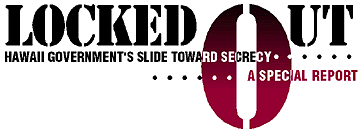

 pen government in Hawaii is being eroded by legislative and administrative actions chipping away at a 1988 law guaranteeing public access to official records.
pen government in Hawaii is being eroded by legislative and administrative actions chipping away at a 1988 law guaranteeing public access to official records.And advocates of the public's right to know predict even more secrecy ahead as elected officials, state and county bureaucrats and public employee unions take aim at provisions of the Uniform Information Practices Act.
The 1988 law required government information to be available to the public unless it fell within a small number of specific exceptions. But the exceptions, expanded by piecemeal amendments and administrative policies, have been getting broader, critics say, going beyond the original intent to protect only intimate personal details or information declared secret by other laws.

"If this process continues, the law will be a piece of Swiss cheese, full of holes," warns Moya Davenport Gray, director of the Office of Information Practices.
"It isn't just any one thing," says information advocate Desmond Byrne. From county councils to the Legislature to the governor, officials are sliding toward secrecy, Byrne said.
For example:
 The Legislature this year approved a proposal by the Cayetano administration to carve out exemptions to the state "Sunshine Law" that will allow members of boards and commissions, including county councils, to meet secretly to discuss public business.
The Legislature this year approved a proposal by the Cayetano administration to carve out exemptions to the state "Sunshine Law" that will allow members of boards and commissions, including county councils, to meet secretly to discuss public business.
 Powerful public employee unions have succeeded in cutting off access to information about disciplinary action against public employees, particularly police officers and educators.
Powerful public employee unions have succeeded in cutting off access to information about disciplinary action against public employees, particularly police officers and educators.
 The Office of Information Practices, set up to streamline access to government records, virtually collapsed last year under a backlog of cases and is now often a stumbling block instead of a facilitator of public access.
The Office of Information Practices, set up to streamline access to government records, virtually collapsed last year under a backlog of cases and is now often a stumbling block instead of a facilitator of public access.
Byrne says Gov. Ben Cayetano hasn't lived up to campaign promises.
"He started off with this rhetoric in his first State of the State address: 'If you want something, just ask for it.' Well, that's not true," Byrne said.
Cayetano declined to be interviewed. He referred questions to Attorney General Margery Bronster, who insists the administration is committed to open government.
Byrne accuses legislators of reacting to public criticism of campaign finances, ethics, gifts and retirement pay by trying to block public access to potentially embarrassing information.
While special-interest groups want to withhold information for their own reasons, the public often doesn't recognize when its rights are threatened until after restrictive legislation is passed.
"I contend that people don't understand the First Amendment and freedom of information until they request information from government and get turned down," Monson said.
Barbara Fought, a former newscaster now teaching at Syracuse University, said, "Usually people aren't aroused until the group home is coming into their neighborhood and they want information about it, or when their children's favorite teacher is suspended and they want to know why."
Forrest Landon, retired executive editor of the Roanoke Times and director of the newly formed Virginia Coalition for Open Government, said, "In the eyes of legislators, public access to information is often seen as just a way to sell newspapers or increase a broadcast audience."
Sue Hale, current president of the National Freedom of Information Coalition, says legislatures fail to look at the larger role that public information plays.
"The public wants to know how tax dollars are spent," Hale said. "We want to know the size of those public salaries. The people as employers want to know.
"Legislators forget that the protections we receive in a democracy come largely from the fact that this information is being made public."
Sometimes secrecy provisions were buried in lengthy bills on apparently unrelated subjects. For example, one of the proposals to legalize gambling would have declared all information about the gambling industry and its regulation confidential, Gray said. That bill did not pass, but it showed how the legislative process can conceal proposals that affect access to information.
In Florida, one of the most open states, a recent constitutional amendment requires any proposal that limits public access to information to be presented to the Legislature in a separate single-subject bill, said Barbara Petersen, director of the Florida First Amendment Foundation.
Petersen said many of the 600 exemptions came when proponents of openness let down their guard.
"We had a heyday when we had this great law; then we got complacent. Suddenly we had all these bad laws to deal with," Petersen said.
Hawaii has gone through a similar cycle. Strong public protests in reaction to excesses of government secrecy in the early 1980s led to the 1988 reforms. Since then, public attention has gone on to other issues, while foes of openness have fought back.
"A case can be made that the strongest moving force for denying public access to information is coming from the people the public hires, from the public employee unions," said Herbert Strentz, a journalism professor at Drake University and executive secretary of the Iowa Freedom of Information Council.
He said: "There is a wrongheaded notion that public employees should not be any different than private-sector employees, forgetting about who is doing the hiring and who they are working for."
Rebecca Daugherty of the Washington, D.C.-based Reporters Committee for Freedom of the Press, finds the union role surprising: "The idea that the government can do something to you and not be accountable for it would seem a notion that would be more noxious to people so dependent on the government."